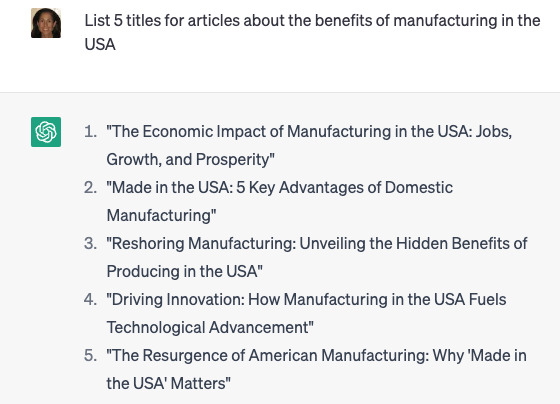Using ChatGPT for Your Marketing

ChatGPT has come up in conversations with clients who aren’t sure how to use the tool in their marketing. Here are tips on how to take advantage of this emerging technology that you can try for free.
Not familiar with ChatGPT?
ChatGPT is the hot artificial intelligence (AI) tool that’s attracting a lot of attention from investors, software companies, gamers, marketers, and pretty much everyone. Why? The technology allows you to have human-like conversations with a chatbot. It’s like a game of pickle ball: talk, reply, talk, reply. Unlike Google, when you ask a question or type in a statement, you receive a text response, not a list of links.
How does ChatGPT work?
ChatGPT is a natural language processing tool driven by AI technology. The language model can answer questions and assist with a variety of tasks, from composing an email to developing topic ideas for an article to writing a script for a how-to video.
How can you try it?
The beauty of ChatGPT is its accessibility. Type ChatGPT in your browser and openai.com/blog/chatgpt will appear. Scroll down and click on “TryChatGPT”, set up an account, and then you’re ready to go.
How can you use ChatGPT in your marketing?
Use Case #1: Generate topic ideas for articles, blogs, videos, etc.
Suppose you’re a US manufacturer and want to include an article about the benefits of manufacturing in the US in your next customer newsletter. Here’s ChatGPT’s output on the subject.

While the ideas may not be perfect, they provide a great starting point. Rather than having a blank slate, you now have multiple ideas from which you can cut and paste the best thoughts.
ChatGPT isn’t ready to provide text that is exactly what you need, what it can provide are a number of answers that appear to be what you are looking for based on similar questions asked by others on the internet.
Use Case #2: Write Content
AI can generate texts for emails, social media posts, blog articles, and storytelling for products and services. It’s a great first step when you’re creating content. The output needs to be fact-checked, sprinkled with empathy, and edited for potential biases.
Ask ChatGPT to write a 500-word article on a topic your customers would find relevant and valuable. It’s a great way to kick start the process.
Use Case #3: Explain Complicated Topics
Have complex product information to explain in an installation manual or a how-to video? Type in the complex product information and ask ChatGPT to explain it in language that’s easy to understand.
What can’t ChatGPT do?
ChatGPT can’t be used as an authoritative source of information.
It was trained on text from a variety of sources including Wikipedia, books, news articles, scientific journals and the like. The dataset only goes up to 2021, which means it lacks information on more recent events.
ChatGPT can’t convey empathy.
The technology does not possess emotional intelligence. It cannot detect emotional cues or respond appropriately to complex emotional situations. Marketers must emotionally connect with their audience to have a lasting impact. So, when using ChatGPT, we need to tweak the text to personally connect with the reader.
ChatGPT can’t multitask.
It can’t produce content about a topic and at the same time, optimize it for SEO (search engine optimization).
ChatGPT has limited memory.
The AI tool can’t save or search for responses from your previous prompts.
ChatGPT is a useful tool for marketers. However, it’s not a one and done solution. So far, the power of AI lies in getting us from stalled to first draft. It can’t produce text that emotionally connects with your audience. That’s where we marketers come in.
What to talk brand? Connect with me at laura@vivalabrand.com
